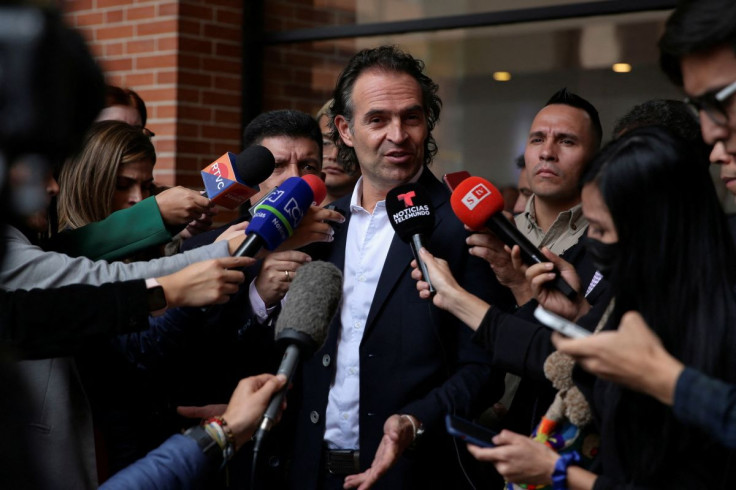Colombia Candidate Gutierrez Backs Subsidies, Businesses To Stoke Growth

Colombia's economy must grow by more than 5% per year and the government should fund a basic income for the poorest households if the country is to tackle deep inequality, center-right presidential candidate Federico Gutierrez said on Wednesday.
Gutierrez, a former mayor of Medellin, is second in the polls ahead of what will likely be a first round of voting on Sunday, with some 25% support.
Gutierrez has taken pains to emphasize his proposals to reduce grating poverty, especially amid generous social investment promises by leftist front-runner Gustavo Petro, who alleges that Gutierrez will continue unpopular policies from the current government.
"What's working now won't just continue, we'll improve it, and what doesn't work will change. It's that clear," Gutierrez, who has rejected claims he is the continuity candidate, told Reuters as an armored car ferried him to a Bogota television studio.
"To close social gaps we need to grow at a minimum of more than 5% each year for the next four years," said the candidate , who goes by 'Fico'. "Clearly there is a need to give subsidies because there are people going hungry, but an eternal subsidy doesn't get people out of poverty."
"We need people to have education, housing, real opportunities, to be able to create businesses, for that the economy has to grow," said the husband and father of two.
He wants successful businesses to pay bonuses and would institute a basic income for five million poor households and free tertiary education for lower-income students.
Petro has said he will bar new oil contracts, but any energy transition will need to come more gradually, Gutierrez said, given how vital those commodities are to Colombia's income.
He will not allow fracking until he sees the results of planned pilot projects, Gutierrez added.
Unlike President Ivan Duque, who was backed by political kingmaker and ex-president Alvaro Uribe, Gutierrez said he voted in favor of a 2016 peace deal with the FARC rebels and wants it fully implemented.
And he invited the still-active National Liberation Army rebels to extend a ceasefire declared ahead of the vote.
"If they show that desire for peace, once I win the presidency I will sit down to start a negotiation," Gutierrez said.
But he ruled out talks with former FARC fighters who reject the accord and with top criminal gang the Clan del Golfo, saying surrender is their only option.
The fight against violence, drug trafficking and illegal mining will be won not only with security forces but by expanding social services, he said.
"I don't consider state presence to just be troops," the 47-year-old said. "We need to guarantee security for everyone but we must understand that we must arrive with social investment."
Colombia should open a major border crossing with Venezuela - with whom it does not maintain diplomatic relations - to cargo shipments to boost trade, said Gutierrez, adding he also supports re-opening consular services in the neighboring country.
Gutierrez has cast himself as free from political masters and therefore the candidate best capable of working with a divided congress.
"Colombia needs a change, but it can't be a change that makes things worse."
© Copyright Thomson Reuters 2024. All rights reserved.





















